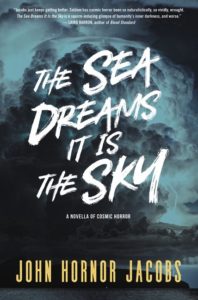The Sea Dreams It Is the Sky is a dark and intently written horror novella that shows the breadth of the author’s skill.
A fictional South American Country. Two expatriates, an old poet with a long history of tangling with the autocratic regime that runs his homeland, and his young protege, a young college professor who is drawn to him, and his connection to their homeland of Magera. An unlikely friendship, a manuscript telling awful secrets, and a compulsion to return to her homeland. These and much more are the elements of The Sea Dreams It Is the Sky, a literary cosmic horror novella from John Hornor Jacobs.

The novella right off is very much unlike much of the rest of the author’s oeuvre, which I have read a large majority of. There is a dark style, strong action beats, and rich, deep, detailed worldbuilding. There is an intensity to his work that is immersive, be it post-apocalyptic landscapes, a Mythos-infused southern US, or an Alternate magic-fueled Roman empire fighting against enemies from without and within. The author turns that skill to here, but there is much more to the novella than that chassis. The Sea Dreams It Is the Sky is a very different work, and a very different kind of work for the author. In many ways it is far more of a literary work than a genre work, relying on very different strengths and giving a very different reading experience. As I started to read the novella and immerse myself within it, I wondered at first if this was really a genre work at all. Sure, Magera is a fictional South American country, but that alone does not make it a genre work.
I began to see and understand as the novella progressed. As the main character, Isabel, delves deeper into the poet Avendaño’s work, and into his past, the genreness of the work, and the world, slowly seeps in. The otherworldly horror (and the very real non-genre horror) of the regime that holds Magera in thrall starts to manifest, first in the words of the poet himself that Isabel investigates, and then the Opusculus Noctis, the strange manuscript, accompanied by disturbing photographs, whose translation was the obsession of the poet, and then becomes the obsession of Isabel herself. The strange messages with coordinates, drawing Isabel back to Magera, deep within South America, and to a terrible fate. The Opusculus Noctis, I recalled, was the name of the terrible book that I first encountered in his Lovecraftian novel Southern Gods. I saw the cosmic horror connection for what it was, and it transformed my vision of the book entirely.
I began to see just what Jacobs had done here in this slim novella, enlightened darkly, like one of its protagonists. In Southern Gods, music and madness, and unspeakable texts had infected the southern US of the 1950s, threatening to spill ever further, corrupt more and more beyond the backwoods. Here, in The Sea Dreams It Is the Sky, I discovered that the fictional country of Magera was another location of that irruption, another locus for that otherworldly outer darkness seeking to change the world, and darkly. The racism and violence of the South of the 1950s was a song that was in dark harmony with the Lovecraftian elements. Here, in Magera, the authoritarian and tyrannical regime that holds Magera in its fist is the dark harmony to the Lovecraftian forces seeking to come out there in that dark and imaginary land. As far as I can tell from coordinates and references, Magera in his world stretches from the Pacific, up onto the altoplano, and possibly, it is not clear, all the way to the Atlantic. It sits in the heart of South America, imaginary, dark, and a wellspring that is evil. And yet for all that it is a wellspring that neither Avendaño nor Isabel can resist returning to. Like Ravenloft and its mists to draw people in and back in, the corruption of the land is far more than in Southern Gods, a land that always seeks to draw its citizenry back, especially when aided by the power of something like Opusculus Noctis.
The dark, measured prose, mixed with this gradual immersion into otherworldly horror, makes the novella confident, powerful and abiding. Parts of it are not easy to read, the author does not flinch from the description of what a brutal regime can and would do. And yet, I find myself, too, wondering what it would be like to travel to Magera, and photograph and document, and bear witness to what I might find there. The imagery and landscapes reminded me of The Motorcycle Diaries, but the depiction of those landscapes and the use put to them is far, far different. The Sea Dreams It Is the Sky is possibly Jacobs’ best work yet.







